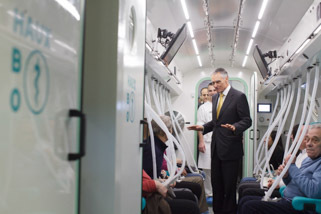
The award of the Leya Prize is a matter of special joy for us Portuguese, and for the entire Portuguese speaking world.
This prize is intended to encourage the production of original fictional works in Portuguese. In the short number of years of its existence it has already been awarded to a Brazilian author, a Mozambican and two Portuguese. The reason for its existence is thus proven as well as its true Portuguese mission.
In a short time, the Leya Prize has become consecrated as an encouragement and an opportunity to reveal new values, in any of the several literatures that are nowadays expressed in Portuguese.
The success of the initiative is owed, before any other consideration, to its promoters, an entrepreneurial group that knew how to interpret the feelings and the vitality of the Portuguese speaking world, launching an editorial project whose limits of possible expansion is widened to several continents.
In 2009, when the Leya Prize was awarded to its first winner, I had the opportunity to state: «In order that spoken Portuguese becomes a reality, and not just an echo from the past, it is necessary that dynamic economic and cultural projects are created and developed in its area. The existence is necessary of people and companies that are able to interpret, in real initiatives, all the potential that resides in the fact that we share a common language with so many nations».
Four years later, I congratulate the Leya Group, particularly for having known how to keep up this prize, which is a symbol of what may become the community of Portuguese speaking nations and States.
I also want to congratulate this year’s prize winner, engineer Nuno Camarneiro, whose novel, «Under a Sort of Heaven» was distinguished by a jury made up of writers and academicians from Angola, Brazil, Mozambique and Portugal, and presided over by poet Manuel Alegre.
Having been chosen amongst hundreds of candidates from Portuguese speaking countries, some of them living as immigrants in France, Canada or the United Kingdom, is the best proof that the talent shown by Nuno Camarneiro deserves our admiration and our applause.
I thus want to express my pleasure with the success reached by this his second book. I wish him the best of happiness. Hopefully he will achieve his best dreams and proceed with success along the literary calling which he has proven.
I equally hope that the Leya Group keeps up this initiative, which can achieve so much, both through the encouragement given to writers and through the consolidation of the global network in which are interlinked the nearly 250 million people whose official language is Portuguese.
In truth, without writers, the speaking of Portuguese would be a soulless project.
It is writers who, through their imagination and creativity, maintain a language alive.
It is they who build and express in words those intangible bridges that connect persons and peoples, cementing collective identities.
A policy promoting the Portuguese language cannot ignore the literary works written in Portuguese and that are one of its main vehicles for worldwide projection.
It is true that all Portuguese speaking States are showing a drive to narrow the bonds that link them. We know that such a union will contribute towards the development and the prosperity of the peoples.
But what unites us is more than a simple political and diplomatic design, which could be at the mercy of circumstances and of the will of the decision takers.
In addition to being politically associated and sharing the same language, the peoples that comprise the Portuguese speaking project have in common centuries of history.
The Portuguese language is vested upon a foundation of feelings and common emotions, a set of memories and values that we all nurture, notwithstanding the existing differences between the cultures that are characteristic to each of our nations.
This is, at any rate, the meaning of the decision of the Council of Ministers of the Community of Portuguese Speaking Countries (CPLP) that consecrated the date of 5 May as the Day of Portuguese Language and Culture in the CPLP «considering», as stated in the official resolution, «its growing assertion in the Member States and in the international community».
The best proof of this community that we are building, in spite of the differences that separate us, are initiatives such as the Leya Prize, that call on, in the same competition, authors originating from such a diversified universe as is that of the literatures that are expressed in Portuguese.
It is necessary to know how to enhance and take advantage of this reality which is the growing dissemination of the Portuguese language in the international landscape, where translations of and curiosity over Portuguese fiction has proliferated, in its various tones and in its various ways of speaking and feeling.
To be equally recognized is the importance this phenomenon may represent for the identification and assertion of an international space, which has historical and cultural roots, but whose potentiality spreads over many other fields.
In a world in which the so called «spiritual borders» are growingly becoming imposed, the consolidation of spoken Portuguese is a task that must be given priority.
For these reasons, I renew my congratulations to the prize winning author and to the Leya Group, and express my wishes for the best success in their work on behalf of the dissemination of literature in the Portuguese language.
Thank you very much.
© 2006-2016 Presidency of the Portuguese Republic
You have gained access to the records of the Official Site of the Presidency of the Republic from 9 March 2006 to 9 March 2016.
The contents available here were entered in the site during the 10 year period covering the two mandates of President of the Republic Aníbal Cavaco Silva.